FEBRUARY
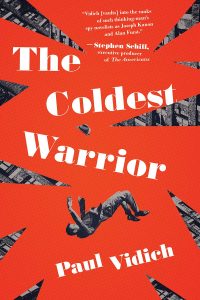 Paul Vidich, The Coldest Warrior
Paul Vidich, The Coldest Warrior
Pegasus, February 4
The title does double duty here—Vidich’s latest is about a cold case investigation during the Cold War, split between the 1950s and the 1970s. In 1953, a CIA scientist’s death from falling is quietly labeled as suicide; two decades later, a friend of the family reopens the case after learning that his old comrade’s demise may have been linked to experiments in psychedelic drugs. A richly detailed work of investigative crime writing perfect for fans of procedurals and spy fiction alike. –Molly Odintz, CrimeReads Associate Editor
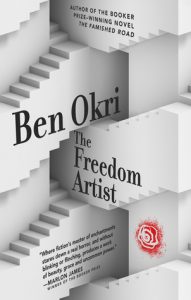 Ben Okri, The Freedom Artist
Ben Okri, The Freedom Artist
Akashic, February 4
The latest novel from the Booker Prize-winning author of The Famished Road has already been out in the UK for a year; I have no idea why we’ve had to wait so long to read it stateside. The Freedom Artist is a fable-like allegory set in a dystopian future in which the “Hierarchy” is dominant, the citizens trapped and muted, except sometimes when they are heard screaming in their sleep. It is through this world that Karnak must travel to find his lover, who has been arrested for asking the question: “Who is the prisoner?” –Emily Temple, Lit Hub Senior Editor
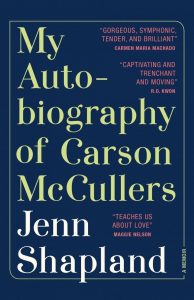 Jenn Shapland, My Autobiography of Carson McCullers
Jenn Shapland, My Autobiography of Carson McCullers
Tin House, February 4
I used to work with Jenn Shapland as a bookseller back in Austin, where we both interned at the Harry Ransom Center, one of the nation’s best literary archives, at different points in our academic lives. Her debut is a beautifully written and hard-to-categorize meditation on Carson McCullers and the hidden literary history of queer women, inspired by Shapland’s work cataloguing McCullers’ personal effects at the Ransom Center, then later discovering transcripts from McCullers’ therapy sessions at a different archive that gave voice to the desires that remained subtext in most non-fiction treatments of McCullers’ work. Already earning blurbs from the like of Maggie Nelson, this one is not to be missed! –Molly Odintz, CrimeReads Associate Editor
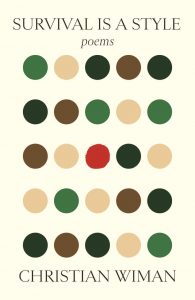 Christian Wiman, Survival is a Style
Christian Wiman, Survival is a Style
FSG, February 4
Christian Wiman has for a long time been the poetry world’s navy blue jacket with a surprisingly silk lining. Survival is a Style turns these modes inside out, embracing vibrancy as a way of being, and somber formality as, well, a formality to be deployed. The wisdom of experience, which he bore with great dignity in his work of the past decade, across memoirs and poems that probed faith and mortality, is now simply inhabited. Here are poems of exuberant observation and a hard won freedom. In some cases, even of the liberty to be silly. One tiny miracle of this new work is that Wiman does not simply report from this newly reached territory: he makes the best parts of it ours, transferring the sound, the gladness, the awareness of how temporal all of it is, right into our bodies. –John Freeman, Lit Hub Executive Editor
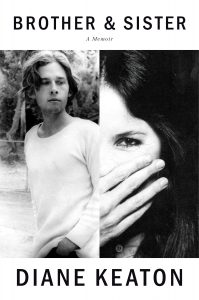 Diane Keaton, Brother & Sister
Diane Keaton, Brother & Sister
Knopf, February 4
If you’ve been following Diane Keaton’s life on screen—if you loved her in The Godfather and Annie Hall and Something’s Gotta Give and the severely underrated Morning Glory—you might be curious about her life off of it. Enter: Brother & Sister, her new memoir about her complicated, winding relationship with her younger brother. As children, they were thick as thieves. As adults, their paths diverged. Not only is this a deeply personal portrait of Diane Keaton’s family, but it’s also a beautiful look at the bonds and barriers of siblinghood. –Katie Yee, Book Marks Assistant Editor
 Sarah Gailey, Upright Women Wanted
Sarah Gailey, Upright Women Wanted
Tor, February 4
Sarah Gailey impressed us all with their debut Magic for Liars, a queer romance meets murder mystery investigation set inside a magic school, and their followup promises to be just as genre-bending. In Upright Women Wanted, Gailey creates a neo-Western adventure set in the near future, in which gunslinger librarians fight post-apocalyptic fascists, which sounds both politically responsible and incredibly fun. –Molly Odintz, CrimeReads Associate Editor
 Judith Butler, The Force of Non-Violence
Judith Butler, The Force of Non-Violence
Verso, February 4
Considering the rise of punching-a-fascist videos, it may not appear to be the best timing for a book on nonviolence. Unless, of course, you are the University of California theorist Judith Butler, who has made a profound contribution to the theory of nonviolence in this short new book. It is precisely when violence seems most obvious, Butler argues, that we need to imagine an alternative. If only because, for Butler, nonviolence is “a sustained commitment, even a way of rerouting aggression for the purposes of affirming ideals of equality and freedom.” There are no breaks, in that sense, Butler argues, in the position, no loopholes, because for nonviolence to be coherent it must undertake a utopian view that all lives are equally valuable, that they are, to use her word, worthy of grief. Following Butler as she works piece by piece through her argument, prizing aggression apart from violence, fantasy (conscious dreaming) from phantasy (uncontrolled) is nothing short of dazzling. There is a contradiction at the heart of her logic too that she explores in great depth. That for us to live in a state of nonviolence we need to also dismantle individualism. For there we learn the notion of self-value over others. It is heartening in dark times to see a philosopher of this calibre using the light of her sharp mind to see a way toward pacifism. –John Freeman, Lit Hub Executive Editor
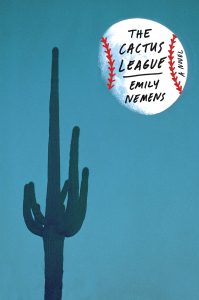 Emily Nemens, The Cactus League
Emily Nemens, The Cactus League
FSG, February 4
Baseball has always been America’s most literary of sports, its regal (some would say glacial) pace an ideal stage for intimate human drama: dizzying highs, bathetic lows, extreme close-ups, all in nine innings. So I’m pretty excited to see what Paris Review editor Emily Nemens does against the backdrop of major league spring training in the Arizona desert. I’ve long been a fan of Nemens’ short fiction, and everything about this debut novel—a golden boy on the edge, old-timers trying to stay relevant, a sportscaster narrator—has it at the top of my TBR pile. –Jonny Diamond, Lit Hub Editor in Chief
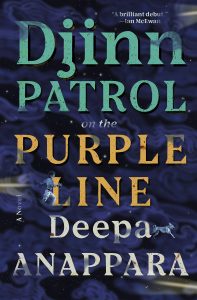 Deepa Anappara, Djinn Patrol on the Purple Line
Deepa Anappara, Djinn Patrol on the Purple Line
Random House, February 4
Debut novelist and journalist Deepa Anappara’s Djinn Patrol on the Purple Line is one of the more anticipated books of 2020, having been hailed by authors like Ian McEwan, Anne Enright, and Chigozie Obioma. Set in a Delhi shantytown, Djinn Patrol is loosely inspired by a series of real-life child disappearances that happened throughout urban areas in India. When a young classmate goes missing, nine-year-old Jai, a fan of reality detective shows, and his friends Pari and Faiz decide to use the lessons they’ve learned from TV to find their friend. But more and more children continue to disappear. An apathetic police force (and rumors of a demonic djinn) compound the children’s problems, and what begins as an innocent search evolves into something much darker. –Aaron Robertson, Lit Hub Assistant Editor
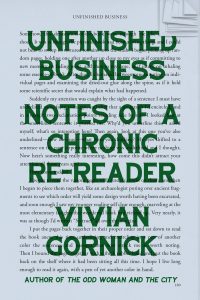 Vivian Gornick, Unfinished Business
Vivian Gornick, Unfinished Business
FSG, February 4
It has been Vivian Gornick’s position that the work of self-analysis is never complete. Some might find in this endlessness a horror; Gornick has made of it a strength, turning her search to understand herself, in books like The Odd Woman in the City, and Approaching Eye Level, into a sound unlike any other in American life writing. Gornick’s prose is warm where others are ashamed, open-ended where others slam shut doors and scold, funny when so many take themselves too seriously. Gornick brings all these sounds to the work of reading, too, which she views with the same infinite loop. “It has often been my experience that re-reading a book that was important to me at earlier times in my life is something like lying on the analyst’s couch,” she writes in the opening of her latest book, Unfinished Business, a meditation on rereading. These new essays, drawing from errands of introduction and anniversaries of convenience, return to authors she has read before and sees them anew: D.H. Lawrence, Marguerite Duras, Colette, Elizabeth Bowen, A.B. Yeshuoa and others appear in the lamplight of her attention and are regarded with fondness and, in some cases, intriguing autobiographical lacunae. No light entertainments in the bunch. “I’d grown up in a noisy left-wing household where Karl Marx and the international working class were articles of faith,” Gornick reminds, at one point, “feeling strongly about social injustice was a given.” For more on that, pick up Gornick’s The Romance of American Communism, which is being reissued in February by Verso. It contains a miniature political biography of Gornick’s family at a time when communism, in America, was on its death throws, and her part of the Bronx still spoke Yiddish. Meanwhile, if you need to be reminded of the lifelong luxuriance of reading, it’s hard to imagine another book in 2020 will come even close to Gornick’s Unfinished Business. –John Freeman, Lit Hub Executive Editor
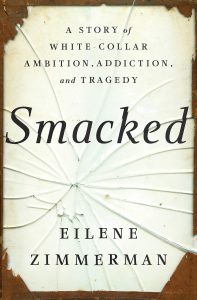 Eilene Zimmerman, Smacked
Eilene Zimmerman, Smacked
Random House, February 4
Addiction narratives come in many shapes and sizes and we need to pay attention to all of them—America remains in the grip of a corporate greed-induced opiate epidemic that does not recognize lines of class or race. For journalist Eilene Zimmerman, the story she unravels is a deeply personal one as she tries to understand the secret addictions of her ex-husband, a highly successful workaholic who loses his life to an ever-intensifying series of reliance on pills, cocaine, methamphetamine, and opioids. But Zimmerman goes a step further in her reporting to reveal a professional world of high-achieving personalities who’re more often than not vulnerable to the temptations of addiction. –Jonny Diamond, Lit Hub Editor in Chief
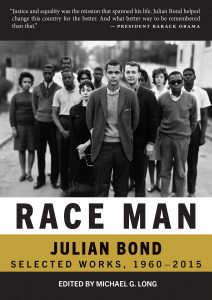 Julian Bond, Race Man: Selected Works, 1960-2015
Julian Bond, Race Man: Selected Works, 1960-2015
City Lights, February 4
When he died in 2015 at age 75, Julian Bond had spent nearly 60 years promoting his race. He was a race man in the old fashioned sense of the word, in the way Thurgood Marshall was a race man. As Bond himself put it simply in his only book, the 1972 A Time to Speak, a Time to Act. “Most of my life has been colored by race, so much of my thinking focuses on race.” As an activist, one of Bond’s extraordinary qualities is how broadly he interpreted this act of thinking, how many ethical dilemmas rolled into it. How unstinting was his commitment to nonviolence. This meant, for him, joining hands with LBGTQ activists, advocating for fair and equally funded education, it meant protesting the apartheid regime in South Africa. It meant expanding the notion of what it means to be violent. “Violence is black children going to school for 12 years and receiving 5 years of education,” he writes. This book, assembled from talks and essays, op-eds and other literary interventions, is an inspiring example of how broad and many-sided a life spent advocating for black liberation could be in the 1960s, 1970s and on to our day. Bond was well aware of the Second Reconstruction being recreated in America, and the legal push to undo all of Johnson’s civil rights legislation. He would have despaired at Trump’s election and the way the courts are being packed with fellow travelers, chipping away at civil rights protections. Handing victory after victory to people on the side of the powerful and greedy. He also would have found ways to organize. This enormous-hearted, unflinching book gives readers a vision of how that can be done. –John Freeman, Lit Hub Executive Editor
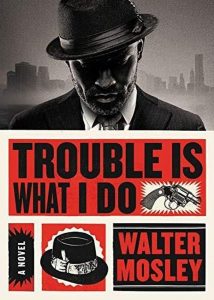 Walter Mosley, Trouble is What I Do
Walter Mosley, Trouble is What I Do
Mulholland, February 4
While Mosley is best known for his Easy Rawlins series, I’ve always been partial to his Leonid McGill series, featuring a morally ambiguous protagonist who protects his family before all else, even as the various members of his extended clan drive him to distraction. Leonid’s new task is irresistible: he’s to inform a prominent white family of their many black relatives, upon the request of an elderly Mississippi bluesman. –Molly Odintz, CrimeReads Associate Editor
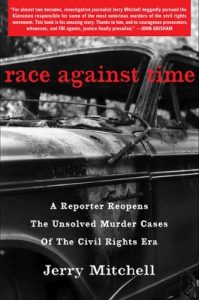 Jerry Mitchell, Race Against Time
Jerry Mitchell, Race Against Time
Simon and Schuster, February 4
It was an open secret, the guilt of those involved in the infamous 1964 murder of three civil rights activists in Mississippi, and yet no murder charges were brought in the wake of the terrible crime. It took 41 years and the tireless work of investigative reporter Jerry Mitchell to finally see the plotters of the Mississippi Burning case face justice, a story revealed one dramatic episode at a time, as Mitchell unearths documents and meets with the very men he’s trying to catch. I wouldn’t be surprised if this shows up on the big screen very soon. –Jonny Diamond, Lit Hub Editor in Chief
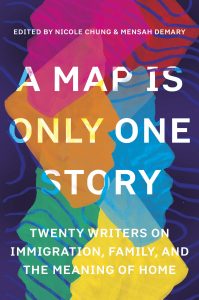 Nicole Chung and Mensah Demary, eds., A Map is Only One Story
Nicole Chung and Mensah Demary, eds., A Map is Only One Story
Catapult, February 4
At Catapult, Nicole Chung and Mensah Demary have worked to publish voices from all over the world on the human geography that defies political borders and how immigration policy takes shape in the everyday lives of individuals. A Map is Only One Story draws from that work, presenting pieces from 20 writers that weave reporting with personal stories of immigration and identity. The collection includes work by a number of writers I’ve read and loved before, including Victoria Blanco, Nur Nasreen Ibrahim, and Porochista Khakpour, along with others who have brought sustained attention to these issues, and I’m excited to see what they all do next. –Corinne Segal, Lit Hub Senior Editor
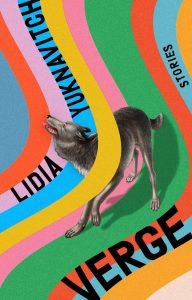 Lidia Yuknavitch, Verge: Stories
Lidia Yuknavitch, Verge: Stories
Riverhead, February 4
In her latest collection of short stories, Lidia Yuknavitch addresses the themes that most interest her, that exist on the verge—as her title says—or on the boundaries between sex and trauma, art and violence. Verge is full of suspense, directed with empathy at describing the psychology of the marginalized. An eight-year-old becomes an underground courier of frozen organs across Eastern Europe; a janitor takes trash and assembles it into a miniature city, a creation which ultimately frightens him. Young or old, male or female, the characters in Verge will shock and impress themselves onto the reader. Yuknavitch has after all been called a “galvanizing” voice in American fiction. –Eleni Theodoropoulos, Lit Hub Editorial Fellow
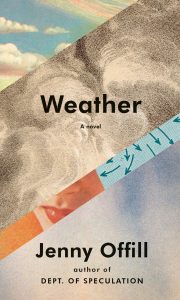 Jenny Offill, Weather
Jenny Offill, Weather
Knopf, February 11
Like Offill’s breakout novel Dept. of Speculation, Weather is slim and elliptical and brimming with intelligence—the kind of book that taps directly into the psyche of a certain kind of reader (and worrier, and parent, and artist). But more than anything, it feels as you read like a mirror held up to the anxieties of the modern moment, that constant mix of global (what will become of our planet, our children, how can we protect either one), massive (how it feels to have elected this president) and personal (what do you do when your brother has a child, and then when his life implodes?). The novel is peppered with wry jokes, invented or borrowed, and it’s hard not to read them as nervous coping mechanisms, like the urge to make a joke after a tragedy. Weather will go down as one of the first great novels to engage directly with climate change and our collective anxiety and denial thereof; I have a hunch many novelists will be following Offill’s lead. –Emily Temple, Lit Hub Senior Editor
 Mark Bibbins, 13th Balloon
Mark Bibbins, 13th Balloon
Copper Canyon, February 11
The day after Mark Bibbins’ friend and ex-lover’s Mark Crast died of AIDS in 1993, 600 balloons were released from Washington Park Lake in Albany to raise money and call attention to people living with the disease. 12 balloons had been sponsored in Crast’s name, but not one for him, hence the title of this fierce, pure, harrowing book length poem, which returns to that time in a series of lyric addresses mostly to the departed. Retelling the story of their love affair, or those terrifying times, of love and desire before the disease and after, and of the strange acoustics danger gives to everyday actions. Bibbins is an agile and knowing poet; a rippling and polished armor coats even his most intimate poems. Who else has absorbed John Ashbery’s lessons as well as he? Here, however, all of that protection has been undressed. The stark, unfussy lines with their steep enjambments make 13th Balloon feel like something rescued from time. If only, one imagines, it could have the safe remove of a relic. But it doesn’t, the book is as raw and shocking as the events it describes must have felt, nearly 30 years ago. The list of exceptional books wrenched from the mouth of the plague is deep, but Bibbins has just added another essential one to it. –John Freeman, Lit Hub Executive Editor
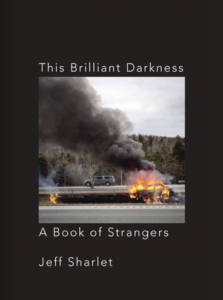 Jeff Sharlet, This Brilliant Darkness
Jeff Sharlet, This Brilliant Darkness
W. W. Norton, February 11
In between his father’s heart attack and his own two years later, Jeff Sharlet collected stories and experiences of those on the outskirts of life—Charley Keunang, a once-aspiring actor shot by the police on LA’s Skid Row; the gay pride amidst the homophobia of Putin’s Russia; homeless teen addicts in Dublin; a lonely woman with dementia whose only friend was a houseplant. This Brilliant Darkness thins the line between author, subject, and reader to ask: how do people live with suffering? –Emily Firetog, Lit Hub Deputy Editor
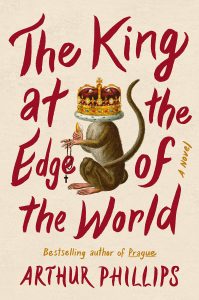 Arthur Phillips, The King at the Edge of the World
Arthur Phillips, The King at the Edge of the World
Random House, February 11
Arthur Phillips is a writer you can’t pigeonhole. Each of his books is quite different, which makes for exciting reading—though he does apparently have a yen for history, as is borne out in his latest. The King at the Edge of the World is set in 1601 as Queen Elizabeth is dying and her agents are trying to figure out if her likely successor, King James VI of Scotland, is secretly a Catholic—and using a physician, maybe “the only Muslim in England” to do so. –Emily Temple, Lit Hub Senior Editor
 Edward Hirsch, Stranger By Night
Edward Hirsch, Stranger By Night
Knopf, February 11
Edward Hirsch’s poetry is deeply felt but not sentimental, accessible but not simplistic. In Stranger By Night, his tenth collection, Hirsch reflects on his life as his vision begins to fail. It strikes me as the perfect book for a moment in which we’re recognizing the importance of doing less—a kind of slow reading. –Jessie Gaynor, Social Media Editor
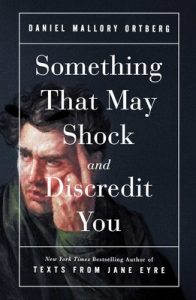 Daniel Lavery, Something That May Shock and Discredit You
Daniel Lavery, Something That May Shock and Discredit You
Atria, February 11
From the author of Texts from Jane Eyre—and one of the few people who can make looking at the internet all the time feel worthwhile—comes a hilarious essay collection that picks apart pop culture as we know it. Can’t wait? You can read an excerpt here. –Emily Temple, Lit Hub Senior Editor
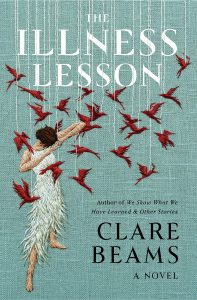 Clare Beams, The Illness Lesson
Clare Beams, The Illness Lesson
Doubleday, February 11
Samuel Hood and his daughter Caroline found a school in 19th-century New England, promising a groundbreaking education for young women. But when a flock of red birds descends on the town, the students begin to get sick—rashes, seizures, headaches, verbal tics, night wanderings. Samuel brings in a doctor who dictates the girls’ experience, and Caroline must choose to defy not only her father but all the men around in her order to save the girls, and herself. –Emily Firetog, Lit Hub Deputy Editor
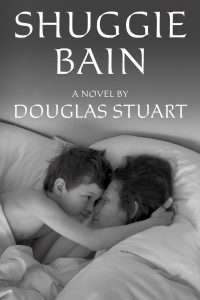 Douglas Stuart, Shuggie Bain
Douglas Stuart, Shuggie Bain
Grove, February 11
This heartfelt and harrowing debut novel—which has been compared to the work of Édouard Louis, Frank McCourt, and Hanya Yanagihara, and which Kirkus has already called “a masterpiece”—from Scottish fashion designer Stuart details the relationship between a sweet young boy and his beautiful, alcoholic mother. Set in 1980s Glasgow—a city ravaged by poverty, drug addiction, and unemployment during the Thatcher years—the book, which unfolds over the course of a decade in a series of vignettes that give a window into the emotional lives of each member of the Bain family, is rightly being heralded for its visceral, emotionally nuanced portrayal of working class Scottish life and its blazingly intimate exploration of a mother-son relationship. –Dan Sheehan, Book Marks Editor
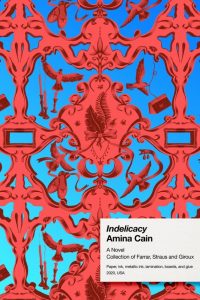 Amina Cain, Indelicacy
Amina Cain, Indelicacy
FSG, February 11
In what Blake Butler described as “a strangely ageless world somewhere between Emily Dickinson and David Lynch” (count me already sold on this novel, to be honest), a cleaning woman at an unnamed art museum in an unnamed city dreams of a life of ease, where she’s free to do nothing but write about art—until she gets it, courtesy of a wealthy husband, and it turns out to be not exactly what she imagined. Patty Yumi Cottrell described it as “an exquisite jewel box of a novel with the passion and vitality found only in rare and necessary works such as The Hour of the Star and The Days of Abandonment. Through this timeless examination of solitude, art, and friendship Amina Cain announces herself as one of the most intriguing contemporary writers of our time.” –Emily Temple, Lit Hub Senior Editor
 Mi-ae Seo, The Only Child
Mi-ae Seo, The Only Child
Ecco, February 11
While much of crime fiction features a parade of children in danger, what about those novels featuring children who are the danger? For those looking to be terrified by sociopathic youths, or those just looking for an all-around nailbiter of a thriller, we recommend The Only Child, in which a behavioral psychologist who studies serial killers becomes the caretaker of a very, very, creepy little girl. –Molly Odnitz, CrimeReads Associate Editor
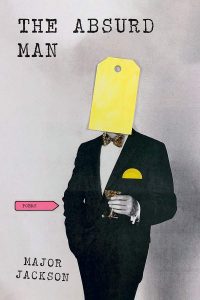 Major Jackson, The Absurd Man
Major Jackson, The Absurd Man
Norton, February 11
Major Jackson’s fifth collection borrows Camus’s figure of the absurd man, searching for meaning in a meaningless world, and reinvents him in the today’s times, sending him on a journey from China to the poet’s own Philadelphia. No American poet wears his genius as lightly as Jackson, whose poems here reach new heights of companionable style. From a simple winter’s day to moving across a city, observing, Jackson writes with the eye of a photorealistic, revealing that even in meaningless, the sights and sounds of the world can be reward enough in a life tilting toward madness. –John Freeman, Lit Hub Executive Editor
 N. Scott Momaday, The Death of Sitting Bear: New and Selected Poems
N. Scott Momaday, The Death of Sitting Bear: New and Selected Poems
Harper, February 12
Although best known for House of Dawn, which won a Pulitzer Prize 50 years ago last year, making him the first Native American to be awarded one, Kiowa writer N. Scott Momaday has always been a poet. “When I was a boy,” he writes in the introduction of these selected poems, “walking in the pristine sunshine and seeing the bright land rolling away to the horizon, the seed of poetry was invested in me.” So much of Momaday’s poetry moves like this statement. As in landscape paintings, the land is active and colored like light. There’s a miniaturization at work on the human. And reading the poems feels like moving through an active space. “On the frosted field,” goes one, “the tracks of many children / crisscross in the noon.” The poem “Linguist” explains, perhaps, how such a stillness is achieved. “First the language of love, / Then that of fear, then that of solitude.” There’s so much space around these poems, Momaday’s elegant discretion allows who decades to pour through them. He is a master of making the immense force of the past felt. “Like grasshoppers,” he writes here, going further back, “the soldiers and settlers came.” The order of that sentence tells you much about how Momaday orders the world. –John Freeman, Lit Hub Executive Editor
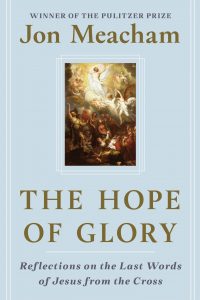 Jon Meacham, The Hope of Glory
Jon Meacham, The Hope of Glory
Convergent, February 12
Pulitzer Prize-winning historian Meacham goes deep on the seven final sayings of Jesus Christ (as recorded in the Gospels), in an attempt to unpack the depth and meaning of Christianity’s foundational words. It is qualities of mercy, grace, and kindness, rather than anger, judgement, and guilt, that Meacham, a former vestryman at Trinity Church Wall Street, seeks to reveal in what is being described as his most intimate book yet. –Jonny Diamond, Lit Hub Editor in Chief
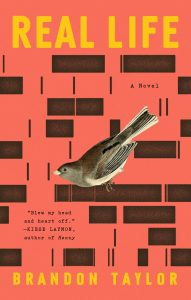 Brandon Taylor, Real Life
Brandon Taylor, Real Life
Riverhead, February 18
Brandon Taylor’s first novel takes place over one weekend at a lakeside Midwestern university. Wallace, an introverted biochemistry grad student from Alabama, finds himself embroiled in an intense, and potentially abusive relationship with a white male student. The story of Wallace’s traumatic past, and his confrontations with racism and isolation, give Taylor’s book the emotionally honest texture that has led various publications to list Real Life as one of the most anticipated debuts of the new decade. –Aaron Robertson, Lit Hub Assistant Editor
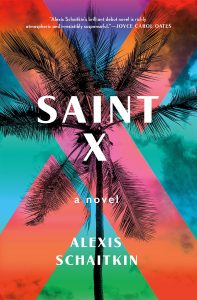 Alexis Schaitkin, Saint X
Alexis Schaitkin, Saint X
Celadon Books, February 18
In Schaitkin’s atmospheric debut novel, seven-year-old Claire’s sister is murdered while their family is vacationing on an unnamed island in the Caribbean (the eponymous Saint X). Though two men are arrested, the evidence against them is watery at best, and they’re soon released. Years later, when Claire is an adult, a chance meeting with one of those men sends her on a quest to find out what really happened to her sister all those years ago. Chang-rae Lee called it “a marvel of a book, a kaleidoscopic examination of race and privilege, family and self, told with the propulsive, kinetic focus of a crime thriller.” –Emily Temple, Lit Hub Senior Editor
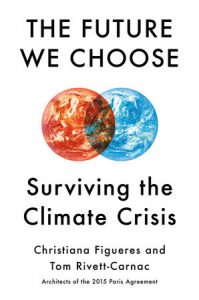 Christiana Figueres and Tom Rivett-Carnac, The Future We Choose
Christiana Figueres and Tom Rivett-Carnac, The Future We Choose
Knopf, February 18
Two of the main architects of Paris Accords lay out in stark detail what remains to be done, and what can be done, to affect the future of our climate. Will anyone listen? They describe two scenarios. What happens to the planet if we do not meet the agreement goals; and what happens if we do. You will want to live in the latter planet. Their style of narration is brisk, informed, and carries none of them gloom porn you sometimes feel in the expanding space of climate catastrophists. Figueres is a diplomat; Rivett-Carnac a political strategist. They are people with almost seventy years of collectivism behind them. Here’s to hoping this book reaches as many people as possible. –John Freeman, Lit Hub Executive Editor
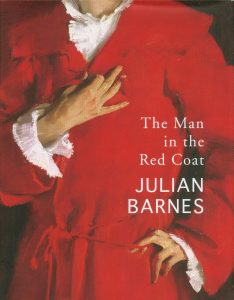 Julian Barnes, The Man in the Red Coat
Julian Barnes, The Man in the Red Coat
Knopf, February 18
Barnes’ new book tells the life story of surgeon and statesman (more widely known by patients and paramours as “L’amour médecin”—Dr. Love), Samuel Pozzi. A society doctor in Belle Époque Paris, he brought pioneering modernity to surgery and patient care while living a famously complicated private life, involving everyone from Henry James and Oscar Wilde to Sarah Bernhardt and Proust. In describing the time and place, Barnes tracks not only the glamor and pleasure of Pozzi’s world but, likewise, the surprising violence, prejudice, and nativism as well. –Emily Firetog, Lit Hub Deputy Editor
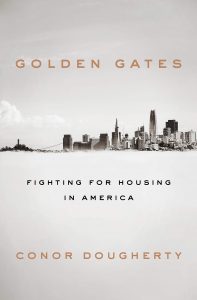 Conor Dougherty, Golden Gates: Fighting for Housing in America
Conor Dougherty, Golden Gates: Fighting for Housing in America
Penguin Press, February 18
Housing is at the core of inequality in the United States. How did it get so hard? Why are so many Americans spending over half their income on rent? How did San Francisco become the home of the $4,000 Chinatown studio? Conor Doughtery’s lucid first book tells this important story, zeroing in on San Francisco, and shining a light on some key heroines, like Sonja Trauss, a law-school and Ph.D drop out who was working at a bakery in Oakland (it was cheaper then commuting to a tutoring job) when she decided to attend a housing hearing and ask a sensible question: why can’t there be more affordable housing built? Why just 83 units? He also introduces us to a nun whose Catholic nonprofit has to fend off real estate speculators in her neighborhood, and a city worker who would rather quit than enforce zoning he knows is unfair. Parts of this book will infuriate, especially as forces mobilize against Trauss’s organization, but watching the various stories unfold Dougherty reveals few outright villains here. Instead, what emerges is a system that has not yet accepted the reality of the people who life within it. Dougherty’s propositions for how to make housing more fair are sane and will ought to influence a debate or two in years to come. –John Freeman, Lit Hub Executive Editor
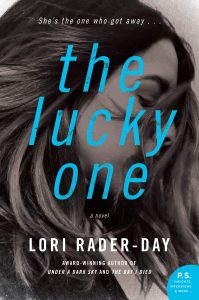 Lori Rader-Day, The Lucky One
Lori Rader-Day, The Lucky One
William Morrow, February 18
In Lori Rader-Day’s new mystery, The Lucky One, protagonist Alice has never quite gotten over her mysterious childhood abduction, despite being found less than 24 hours into her captivity. Decades later, Alice volunteers for an online group in support of those missing loved ones, only to find the face of her captor appear on screen. The Lucky One promises to be another signature Lori Rader-Day blend of psychology, suspense, and noir. –Molly Odnitz, CrimeReads Associate Editor
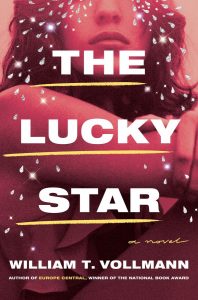 William T. Vollmann, The Lucky Star
William T. Vollmann, The Lucky Star
Viking, February 18
This big, underwater-lit novel returns Vollmann’s work to the dive bars and gender-fluid clubs of San Francisco. Only now it’s 2015 and a very different city. As in The Royal Family, his 1999 epic about a family of sex workers, many of whom lived on the street, the cast of The Lucky Star assembles a family of choice, mostly around a downtown place called the Y, run in part by bartender Francine. There’s a hard-drinking regular named Richard, who sometimes narrates; Shantelle, a transgender sex worker, Neva, who is connected to them all; and someone named Frank, who has changed his name to Judy Garland. Vollmann has been writing in this space since the mid 1980s, when it was considered the demi-monde, but far less so now. Indeed, in the last decade Vollmann himself began cross-dressing under the name Dolores, which led (of course!) to a book, The Book of Dolores, and a write-up in the New York Times. Moving between his cast in these pages, Vollmann admirably captures the pull of vulnerability and invention, how sex can be, in the right space, a powerful way to know one’s self, and ultimately, how much each of his characters here needs a space to be themselves. –John Freeman, Lit Hub Executive Editor
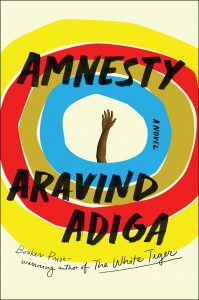 Aravind Adiga, Amnesty
Aravind Adiga, Amnesty
Scribner, February 18
Aravind Adiga’s new novel unfolds over one day in Sydney, Australia, during which Dhananjaya Rajaratnam—aka Danny—tries to outwit an employer’s attempt to silence him. “Danny” is illegal, and earns a living as a house cleaner. When he witnesses what is probably a murder, his client reminds him how easy it would be to drop a call into the Immigration authorities. Adiga is one of the great observers of power and its deformities, showing in novels like his Booker Prize winning White Tiger and Last Man in Tower how within societies, the powerful lean on the less powerful, and the weak exploit the weaker all the way down. Telling the tale of Danny’s immigration along the story of one tense day, he has built a forceful, urgent thriller for our times. –John Freeman, Lit Hub Executive Editor
 Ken Liu, The Hidden Girl and Other Stories
Ken Liu, The Hidden Girl and Other Stories
Saga, February 25
The Hidden Girl is Ken Liu’s first collection since his award-winning The Paper Menagerie and Other Stories was published in 2016. It compiles sixteen of Liu’s recent science fiction and fantasy stories, in addition to a short novel and an excerpt from The Veiled Throne, the third book in Liu’s Dandelion Dynasty Series. If this is anything like his previous work, fans can expect a diverse set of tales that infuse Liu’s often surrealist scenarios with sharp philosophical reflection. –Aaron Robertson, Lit Hub Assistant Editor
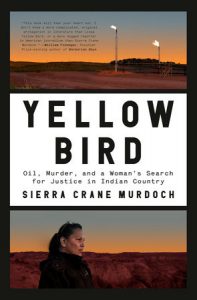 Sierra Crane Murdoch, Yellow Bird
Sierra Crane Murdoch, Yellow Bird
Random House, February 25
Under the auspices of empires and corporations alike, America has been built from murderous and unrelenting conquest: of land, of resources, of people, a war of extraction that continues to this day, at great human cost, in the Bakken oil fields of the Dakotas. Yellow Bird tells the story of Lissa Yellow Bird who returned to her home, the Fort Berthold Indian Reservation, to see it radically changed by the oil fields and the men and money they bring. But it is the disappearance of oil worker Kristopher “KC” Clarke from the reservation oil field that captures Yellow Bird’s attention, and forms the throughline of Sierra Crane Murdoch’s deeply reported story of greed, healing, and generational trauma. –Jonny Diamond, Lit Hub Editor in Chief
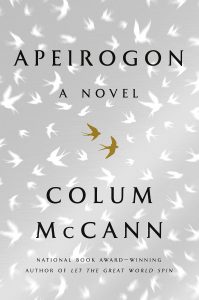 Colum McCann, Apeirogon
Colum McCann, Apeirogon
Random House, February 25
The latest novel from the National Book Award-winning author of Let the Great World Spin tells the story of two men, one Israeli and one Palestinian, both based on real people, both of whom lose their young daughters because of needless violence, and both of whom translate their grief into friendship and joint advocacy for peace. Told in short sections counting down from 500 to 1, and incorporating photographs and quotes from other thinkers, this novel might be McCann’s most ambitious yet. –Emily Temple, Lit Hub Senior Editor
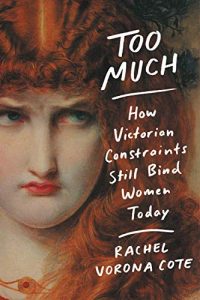 Rachel Vorona Cote, Too Much
Rachel Vorona Cote, Too Much
Grand Central, February 25
Lit Hub contributor Rachel Vorona Cote blends cultural criticism and Victorian literature in a book that explains the ways in which all women are still susceptible to being called “too much,” exploring how culture grinds away our bodies, souls, and sexualities, forcing us into smaller lives than we desire. An erstwhile Victorian scholar, Cote sees parallels between the Victorian fixation on women’s “hysterical” behavior and our modern policing of the same. Too Much encourages women to reconsider the beauty—and power—of their excesses. –Emily Firetog, Lit Hub Deputy Editor
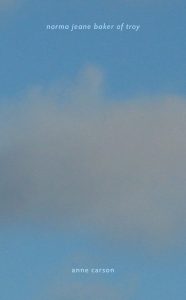 Anne Carson, Norma Jeane Baker of Troy
Anne Carson, Norma Jeane Baker of Troy
New Directions, February 25
Any new book from Anne Carson is reason for celebration. This hybrid work, originally staged as a play (of sorts) at the Shed, starring Ben Whishaw, examines the lives of Marilyn Monroe and Helen of Troy, only merged and transformed as only a poet and classicist of Anne Carson’s quality (and weirdness) would ever think to do. I’m here for whatever she wants to try. –Emily Temple, Lit Hub Senior Editor
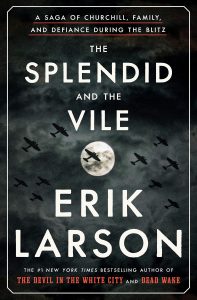 Erik Larson, The Splendid and the Vile
Erik Larson, The Splendid and the Vile
Crown, February 25
When the King asked Winston Churchill to Buckingham Palace on the night of May the 10th 1940, the British Bulldog was not the most obvious choice to replace Neville Chamberlin. Although head of the Admiralty for the second period in war time, Churchill was 65 years old, he drank too much, and he was widely thought to be impulsive. While considered great at orating, he was not deemed reliable. Time would prove this wrong, as Larson’s phenomenal new book reminds in vivid detail as it chronicles Churchill during the Blitz.
Drawing on a forensic level of research, Larson recreates this much studied (and storied) time and brings it viscerally to life. This book is peppered with eye-popping details. Like how the Germans developed bombs which screamed as they fell, to further terrorize civilians. Or that the British public was told if parachuters started landing in their cities to destroy any maps at home and take the carburetor out of their cars to render them useless. Larson describes how for Mary Churchill the war only became real not when her father became PM, but when Cafe de Paris, one of the clubs she used to drink in, was shelled, killing band members and dancers in the middle of a party. One man torn right in half.
And yet the parties continued. As the bombs were dropping, Churchill’s son Randolph was on a ship heading to Egypt, gambling up debts equivalent to $190,000 today. He cabled home to his wife, Pamela, instructing her to pay ten quid at a time to the various shipmates—most of them very wealthy—to whom he’d lost. Pamela eventually sold her wedding presents, jewelry, rented their house out, and moved to London to get a job so she could pay off her husband’s debts.
London through this period was under war rations. At night the city was so black people walked into each other or into the street to be hit by cars. To his credit, Averhill Harriman, though the son of a railroad baron, new what to expect. When he flew to London to meet Churchill and begin coordinating diplomacy, he bought tangerines in Lisbon on his layover and gave them to Clementine Churchill, noticing her unfeigned gratitude.
Drunk and ambitious, approaching his seventh decade, Churchill waded through the conflict doing what he could best: persisting and being stubborn for one. Shortly after arriving, Harriman had dinner with Churchill and wound up spending a bombing raid night with the PM, as 100,000 incendiary canisters were dropped on London. They watched from the roof of No. 10 with metal helmets on. 200 fires were started instantly. Meantime, Churchill prepared the nation with speeches and talks and kept them up as the raids continued. Using that time’s technology to the limits of his reach, but not becoming a demagogue in the process. He wanted England to think of itself and to prepare. This is a deeply compelling work of history, and without resorting to heroism, it makes one long powerfully for real leadership. –John Freeman, Lit Hub Executive Editor
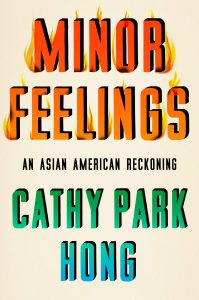
Cathy Park Hong, Minor Feelings
One World, February 25
In this memoir in essays, the poetry editor of the New Republic (and the author of one of our favorite poetry collections of the decade) unpacks her experiences as an Asian American—and the “minor feelings” of shame, sadness, dysphoria, and more which it engenders—as well as the culture, not least the culture of whiteness, that surrounds her. An incisive book from one of our best poets and writers. –Emily Temple, Lit Hub Senior Editor



